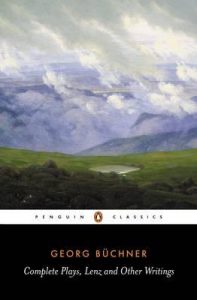The by far most disturbing fairy tale I ever came across in my life, and also one of the most disturbing literary texts I ever encountered goes like this:
“Once upon a time there was a poor little child and had no father and no mother all dead and was no-one left in the whole world. All dead, and it went off, crying day and night. And since on earth there was no-one left it wanted to go up to heaven where the moon looked at it so kindly and when it got finally to the moon it was a lump of rotten wood and so it went to the sun and when it got to the sun it was a withered-up sunflower. And when it got to the stars they were little spangled midges stuck there, like the ones shrikes stick on sloes and when it wanted to go back to the earth, the earth was an overturned pisspot and ‘t was all alone, and it sat down and cried, and it is still sitting there and is all alone.”
(„Es war einmal ein arm Kind und hat kei Vater und keine Mutter war Alles tot und war Niemand mehr auf der Welt. Alles tot, und es ist hingangen und hat gerrt Tag und Nacht. Und wie auf der Erd Niemand mehr war, wollt’s in Himmel gehn, und der Mond guckt es so freundlich an und wie’s endlich zum Mond kam, war’s ein Stück faul Holz und da ist es zur Sonn gangen und wie’s zur Sonn kam, war’s ein verwelkt Sonneblum. Und wie’s zu den Sterne kam, warn’s klei golde Mücken, die warn angesteckt wie der Neuntöter sie auf die Schlehe steckt und wie’s wieder auf die Erd wollt, war die Erd ein umgestürzter Hafen und war ganz allein und da hat sich’s hingesetzt und gerrt, und da sitzt’ es noch und ist ganz allein.“)
Georg Büchner, the author of the enigmatic and unforgettable play Woyczek from which this short fairy tale is taken, lets the grandmother tell this tale to the children that are present. The grandmother speaks in a slightly archaic and dialect-flavoured language which adds to the “gothic” effect. This is not the place to analyse the role of this dark tale within the play but it still gives probably everyone a feeling of utter hopelessness. It is a post-apocalyptic fairy tale, a text without any hope or consolation – and probably a very appropriate text for the situation of mankind today -; the powerful language of Georg Büchner has an incredible effect on the reader, especially when you can read the German original.
In his short life (he died at the age of 23), he created a few works that stand out not only in German literature. His Lenz is for me the best German story and it still blows me away every time I read it. The same goes for his plays Woyczek, Danton’s Death, and Leonce and Lena, or his revolutionary pamphlet – co-authored with Friedrich Ludwig Weidig – Der Hessische Landbote (The Hessian Courier) with the famous slogan “Peace to the shacks! War to the palaces!” („Friede den Hütten! Krieg den Palästen!“)
I will for sure come back to this extraordinary author. If you have an opportunity to find an edition of his Collected Works, get and read it. You won’t regret it.
Büchner’s works have not only been an inspiration for many authors – the most prestigeous German literary award is named in honour of this man who was once a young refugee wanted by the police of his home country with an arrest warrant because of his fight for a democratic and more free society -, also many composers, film directors, and performance artists take inspiration from him. Alban Berg’s opera Wozzeck, Werner Herzog’s movie Woyczek (with Klaus Kinski), and Tom Waits’s song Children’s Story from the album Orphans come to mind. The lyrics of that song: the text of the fairy tale quoted above (in a different translation).
Georg Büchner’s early death was without doubt one of the biggest losses for the world of literature, a real tragedy. His small number of works show an accomplished genius already at a very young age.
Georg Büchner, Complete Plays, Lenz and Other Writings, translated by John Reddick, Penguin Classics, 1993
The translation from German in this blog post is by Thomas Hübner.
© Thomas Hübner and mytwostotinki.com, 2014-6. Unauthorized use and/or duplication of this material without expressed and written permission from this blog’s author and/or owner is strictly prohibited. Excerpts and links may be used, provided that full and clear credit is given to Thomas Hübner and mytwostotinki.com with appropriate and specific direction to the original content.




 Facebook
Facebook RSS
RSS Twitter
Twitter